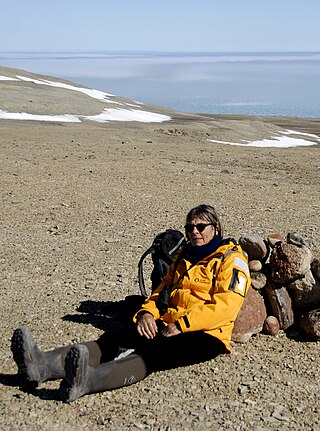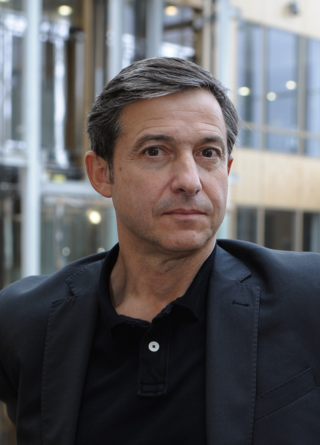Related Research Articles

Anthropology is the scientific study of humanity, concerned with human behavior, human biology, cultures, societies, and linguistics, in both the present and past, including past human species. Social anthropology studies patterns of behavior, while cultural anthropology studies cultural meaning, including norms and values. A portmanteau term sociocultural anthropology is commonly used today. Linguistic anthropology studies how language influences social life. Biological or physical anthropology studies the biological development of humans.
Medical anthropology studies "human health and disease, health care systems, and biocultural adaptation". It views humans from multidimensional and ecological perspectives. It is one of the most highly developed areas of anthropology and applied anthropology, and is a subfield of social and cultural anthropology that examines the ways in which culture and society are organized around or influenced by issues of health, health care and related issues.
Interculturalism is a political movement that supports cross-cultural dialogue and challenging self-segregation tendencies within cultures. Interculturalism involves moving beyond mere passive acceptance of multiple cultures existing in a society and instead promotes dialogue and interaction between cultures. Interculturalism is often used to describe the set of relations between indigenous and western ideals, grounded in values of mutual respect.
Arthur Michael Kleinman is an American psychiatrist, social anthropologist and a professor of medical anthropology, psychiatry and global health and social medicine at Harvard University.

Paul Edward Farmer was an American medical anthropologist and physician. Farmer held an MD and PhD from Harvard University, where he was a University Professor and the chair of the Department of Global Health and Social Medicine at Harvard Medical School. He was the co-founder and chief strategist of Partners In Health (PIH), an international non-profit organization that since 1987 has provided direct health care services and undertaken research and advocacy activities on behalf of those who are sick and living in poverty. He was professor of medicine and chief of the Division of Global Health Equity at Brigham and Women’s Hospital.

Dan Sperber is a French social and cognitive scientist and philosopher. His most influential work has been in the fields of cognitive anthropology, linguistic pragmatics, psychology of reasoning, and philosophy of the social sciences. He has developed: an approach to cultural evolution known as the epidemiology of representations or cultural attraction theory as part of a naturalistic reconceptualization of the social; relevance theory; the argumentative theory of reasoning. Sperber formerly Directeur de Recherche at the Centre National de la Recherche Scientifique is Professor in the Departments of Cognitive Science and of Philosophy at the Central European University in Budapest.
Sir Edmund Ronald Leach FRAI FBA was a British social anthropologist and academic. He served as provost of King's College, Cambridge from 1966 to 1979. He was also president of the Royal Anthropological Institute from 1971 to 1975.
Psychological anthropology is an interdisciplinary subfield of anthropology that studies the interaction of cultural and mental processes. This subfield tends to focus on ways in which humans' development and enculturation within a particular cultural group—with its own history, language, practices, and conceptual categories—shape processes of human cognition, emotion, perception, motivation, and mental health. It also examines how the understanding of cognition, emotion, motivation, and similar psychological processes inform or constrain our models of cultural and social processes. Each school within psychological anthropology has its own approach.

Cora Alice Du Bois was an American cultural anthropologist and a key figure in culture and personality studies and in psychological anthropology more generally. She was Samuel Zemurray Jr. and Doris Zemurray Stone-Radcliffe Professor at Radcliffe College from 1954. After retirement from Radcliffe, she was Professor-at-large at Cornell University (1971–1976) and for one term at the University of California, San Diego (1976).
The Rudolf Virchow Awards are annual American awards in anthropology.

The Health Initiative of the Americas is a Latino program focusing mainly on migrant and immigrant health issues. It is part of the School of Public Health at the University of California, Berkeley (UCB).

Marcia Claire Inhorn is a medical anthropologist and William K. Lanman Jr. Professor of Anthropology and International Affairs at Yale University where she serves as Chair of the Council on Middle East Studies. A specialist on Middle Eastern gender and health issues, Inhorn conducts research on the social impact of infertility and assisted reproductive technologies in Egypt, Lebanon, the United Arab Emirates, and Arab America.
Richard Bauman is a folklorist and anthropologist, now retired from Indiana University Bloomington. He is Distinguished Professor emeritus of Folklore, of Anthropology, and of Communication and Culture. Before coming to IU in 1985, he was the Director of the Center for Intercultural Studies in Folklore and Ethnomusicology at the University of Texas and a faculty member in the UT Department of Anthropology. Just before retiring from Indiana, he was chair of the IU Department of Folklore and Ethnomusicology, as well as an important member of the Department of Anthropology and the Department of Communication and Culture.
Frances Jane Hassler Hill was an American anthropologist and linguist who worked extensively with Native American languages of the Uto-Aztecan language family and anthropological linguistics of North American communities.

Margaret Lock is a distinguished Canadian medical anthropologist, known for her publications in connection with an anthropology of the body and embodiment, comparative epistemologies of medical knowledge and practice, and the global impact of emerging biomedical technologies.

Didier Fassin, born in 1955, is a French anthropologist and sociologist. He is the James D. Wolfensohn Professor of Social Science at the Institute for Advanced Study at Princeton University and holds a Direction of Studies in Political and Moral Anthropology at the École des Hautes Études en Sciences Sociales in Paris. He has been appointed to the Chair of Public Health at the Collège de France. Fassin was elected to the American Philosophical Society in 2022.

Joseph J. Sherman is an American marketing strategist and artist.
Byron Joseph Good is an American medical anthropologist primarily studying mental illness. He is currently on the faculty of Harvard University, where he is Professor of Medical Anthropology at Harvard Medical School and Professor of Cultural Anthropology in the Department of Anthropology.

Seth M. Holmes is the Martin Sisters Endowed Chair Associate Professor of Medical Anthropology and Public Health at the University of California Berkeley. He also serves as founding co-chair of the Berkeley Center for Social Medicine, co-director of the MD/Ph.D. Track in Medical Anthropology coordinated between UC Berkeley and UCSF and is attending physician in the Department of Medicine in the Alameda County Medical Center. A cultural anthropologist and physician, Holmes focuses on social inequalities, immigration, ethnic hierarchies, health and health care. His work has provided a particularly strong ethnographic critique of behaviorism in medicine.
Mary Margaret Clark (1925–2003) was an American medical anthropologist who is credited with founding the sub-discipline of medical anthropology.